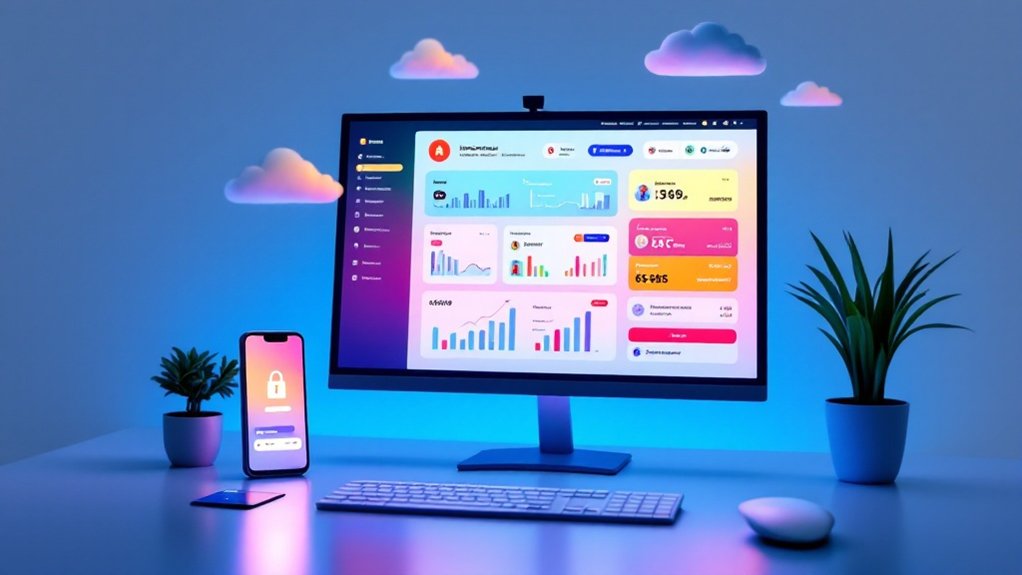Modern ecommerce software enables businesses to sell products online through user-friendly platforms like Shopify, BigCommerce, and Wix. These solutions offer essential features including secure payment processing, inventory management, and mobile-optimized designs. Popular platforms provide built-in marketing tools, analytics dashboards, and seamless integration with third-party apps. Key considerations include security compliance, scalability options, and customer relationship management capabilities. The evolving landscape of ecommerce technology offers increasingly sophisticated options for businesses ready to expand their digital presence.
Quick Overview
- Popular ecommerce platforms like Shopify, BigCommerce, and Square Online offer comprehensive solutions with built-in security and payment processing features.
- Essential ecommerce software components include responsive design, mobile optimization, secure payment processing, and inventory management capabilities.
- Security features such as SSL encryption, PCI compliance, and multi-factor authentication are crucial for protecting customer data and transactions.
- Integration capabilities allow seamless connection with payment systems, marketing tools, and analytics for data-driven business decisions.
- Cloud-based ecommerce solutions provide scalability, ensuring platforms can handle increased traffic and grow with business demands.
Essential Components of Modern Ecommerce Software

Modern ecommerce software stands as the foundation of successful online retail operations. The essential components encompass five core areas that work together to create a robust platform for online selling.
First, user experience features like responsive design and mobile optimization guarantee customers can easily navigate and make purchases across all devices. Implementing breadcrumb navigation helps users easily track their location within the site hierarchy.
Second, robust security measures, including data encryption and PCI compliance, protect sensitive information. These measures support multiple transaction models including B2B, B2C, and C2C operations.
Third, integration capabilities allow seamless connection with payment systems, inventory management, and marketing tools.
Fourth, scalability features enable the platform to grow alongside the business, with cloud hosting and load balancing supporting increased traffic.
Finally, thorough analytics tools provide crucial insights into customer behavior and sales performance, helping businesses make data-driven decisions to improve their operations.
Popular Platforms and Their Unique Features
While numerous ecommerce platforms compete in today's digital marketplace, several industry leaders have emerged as trusted solutions for businesses of all sizes.
Shopify leads with over 8,000 integrated apps and extensive payment options, making it ideal for growing businesses. These platforms utilize centralized database systems to efficiently manage customer information and product catalogs across all sales channels.
Shopify's vast ecosystem of apps and payment solutions empowers businesses to scale seamlessly in the digital marketplace.
BigCommerce stands out with its sophisticated features and robust security measures, including Level 1 PCI compliance.
Square Online appeals to businesses seeking simplicity, offering a free plan and seamless integration with physical point-of-sale systems. For artists and creators, Big Cartel provides a streamlined platform with a free 5-product plan.
Wix provides an all-in-one solution with its user-friendly drag-and-drop interface, while WooCommerce offers unmatched flexibility for WordPress users.
Each platform brings distinct advantages: Shopify excels in scalability, BigCommerce in security, Square in simplicity, Wix in ease of use, and WooCommerce in customization possibilities.
Security and Integration Requirements

Robust security measures and seamless integrations form the backbone of any successful ecommerce platform. Essential security features include data encryption using SSL protocols, multi-factor authentication, and regular software updates to protect against vulnerabilities.
With 92.4% of ecommerce sites containing security vulnerabilities, implementing comprehensive protection is crucial.
Platforms must also maintain compliance with industry standards like PCI-DSS for payment processing and GDPR for customer data protection.
Integration requirements focus on secure API management and careful assessment of third-party plugins. Modern marketing automation tools like HubSpot and ActiveCampaign can enhance customer data security through advanced CRM features. Cloud service security and automated monitoring systems help detect and prevent potential threats in real-time.
Additionally, thorough privacy policies and data access controls guarantee customer information remains confidential. Modern ecommerce platforms implement intrusion detection systems, DDoS protection services, and vulnerability scanning to maintain a secure shopping environment, while staff training reinforces these security measures.
Business Benefits and Growth Opportunities
Countless business benefits emerge when organizations adopt ecommerce software solutions. Companies can notably reduce overhead costs by eliminating physical store expenses while gaining access to global markets and round-the-clock sales opportunities.
The data-driven nature of ecommerce platforms enables businesses to make informed decisions through customer analytics and behavior tracking. Modern analytics tools like Google Analytics provide comprehensive insights into customer behavior patterns. Implementing inventory management tools helps businesses maintain optimal stock levels and automate replenishment processes.
Financial advantages are particularly compelling, with CRM investments yielding up to $8.71 for every dollar spent. Organizations can boost sales by 25-95% by increasing customer retention by just 5%.
The platforms also enable personalized shopping experiences, multiple payment options, and seamless social media integration. These features help businesses build strong customer relationships while maintaining cost-effective operations.
Through marketplace models and various economic frameworks, companies can scale their operations without substantial physical expansion costs.
Future Technological Advancements in Ecommerce Solutions

The technological landscape of ecommerce continues to evolve at an extraordinary pace, building upon the business benefits already established in the industry.
Advanced technologies are reshaping how businesses interact with customers and manage operations, creating more efficient and engaging shopping experiences. With U.S. ecommerce revenue expected to reach over $1.5 trillion by 2028, businesses are increasingly motivated to adopt innovative solutions. Modern platforms leverage dynamic pricing capabilities to optimize revenue and enhance customer satisfaction.
Key technological advancements include:
- AI-powered personalization systems that analyze customer behavior to deliver tailored product recommendations
- Immersive AR and VR solutions enabling virtual product trials and reducing return rates
- Blockchain technology revolutionizing payment security and supply chain transparency
- Voice-enabled shopping interfaces making purchases more convenient and accessible
These innovations are transforming traditional ecommerce platforms into sophisticated digital marketplaces.
As technology continues to advance, businesses that embrace these solutions will be better positioned to meet evolving customer expectations and maintain competitive advantages in the digital marketplace.
Frequently Asked Questions
How Long Does It Typically Take to Set up an Ecommerce Platform?
The setup time for an ecommerce platform varies considerably based on complexity and requirements.
Basic platforms using pre-built solutions like Shopify can be launched within days or weeks.
Moderate complexity sites typically take 3-6 months, while advanced platforms may require 9-12 months or longer.
Factors affecting timeline include customization needs, team expertise, and integration requirements.
Using a minimal viable product approach can help accelerate the initial launch while allowing for later improvements.
Can I Migrate My Existing Online Store to a Different Platform?
Yes, migrating an online store to a different platform is possible and commonly done. The process typically involves transferring product data, customer information, order history, and website content to the new platform.
While migration can be complex, proper planning and execution guarantee a smooth changeover. Key steps include:
- Backing up all data
- Choosing a compatible platform
- Setting up redirects
- Testing functionality
Professional migration services can help minimize disruption and maintain business continuity.
What Are the Average Monthly Maintenance Costs for Ecommerce Software?
Like maintaining a car, where costs vary from basic oil changes to luxury vehicle servicing, monthly maintenance costs for online stores differ based on size and complexity.
Small stores typically spend around $27-100 monthly, covering basic updates and security.
Medium-sized platforms average $100-600 for additional features and support.
Large or custom platforms can reach $1,000+ monthly, including extensive security, performance optimization, and dedicated technical support.
Do I Need Technical Knowledge to Manage an Ecommerce Platform?
While technical knowledge can be helpful, it's not strictly necessary to manage most modern ecommerce platforms.
Today's platforms like Shopify are designed with user-friendly interfaces, drag-and-drop features, and pre-built templates that make management accessible to non-technical users.
Basic operations such as inventory management, order processing, and website updates can be handled through intuitive dashboards.
However, learning some basic digital skills will help optimize the platform's performance.
How Often Should I Update My Ecommerce Software for Optimal Performance?
Studies show that 60% of data breaches occur due to delayed software updates.
For ideal performance, critical security updates should be implemented immediately upon release, while general maintenance updates are best performed monthly. Performance-focused updates can follow a quarterly schedule.
The key is to:
- Run security patches within 24 hours
- Perform maintenance updates monthly
- Test updates in staging environments first
- Monitor performance metrics after each update
- Schedule updates during off-peak hours
Conclusion
Like a well-oiled machine, modern ecommerce software continues to evolve, offering businesses powerful tools to thrive in the digital marketplace. From robust security features to seamless integrations, today's platforms provide the foundation needed for sustainable online growth. As technology advances, merchants who choose the right software solution and stay current with emerging trends will be best positioned to capture tomorrow's opportunities in the ever-expanding world of digital commerce.








